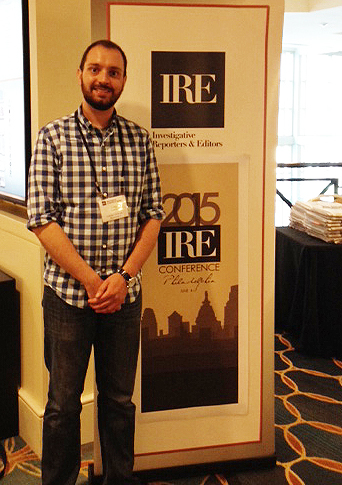Lyons attends investigative reporting conference

Journalism master’s degree student Craig Lyons expanded his professional network and sharpened his journalistic skills at the Investigative Reporters and Editors convention in Philadelphia June 4-7.
Lyons attended as a part of the first IRE Conference College Drive, a new initiative by the organization encouraging colleges and universities to financially sponsor students’ attendance to the conference. Indiana University was one of seven schools to participate in this initiative.
While at the conference, Lyons said he learned new techniques from the best in the industry, attended workshops on reporting beats and talked through roadblocks in information gathering with fellow attendees.
“The biggest takeaway I got from the convention is that you need to have solid traditional reporting skills, but also learn new reporting techniques to build stories with a stronger impact,” he said by phone from Maine, where he is working as a reporter this summer.
Assistant professor Gerry Lanosga, who has taught Lyons in a data analysis course and an independent study course on investigative reporting, asked IU Journalism to sponsor Lyons’ trip through the new IRE initiative. Lanosga volunteers on the member services committee for IRE, which created the college drive. IU Journalism approved Lanosga’s request.
“The journalism administrators recognize the importance of the program’s relationship with professional organizations,” said Lanosga. “They can teach students skills that extend beyond what we can do in a classroom.”
While students can benefit from attending conferences like this, the relationship between organizations and students is symbiotic, according to Lanosga. He said the college drive was an attempt to not only grow future IRE membership but also sustain investigative reporting as a profession.
“Investigative reporting is expensive for media organizations and has been endangered for the past 30 to 40 years,” said Lanosga. “IRE is trying to foster a new generation to carry on a practice that is an important part of American journalism.”
The significant role investigative journalism can play in society is what drew Lyons to the profession and helped him decide to go back to pursue a master’s degree after spending seven years as a government beat reporter.
“Reporting on day-to-day stuff is great and important for the public, but investigative reporting gives me the chance to find larger issues that may not be obvious,” he said. “I want to be in the role to find information people might not have access to and put it out there for public dialogue.”
When it came to looking for a school to pursue his interests in investigative reporting, Lyons said IU’s name was one that kept coming up. Ultimately, it was the program’s esteemed faculty members, like Lanosga, who helped Lyons choose IU.
As a broadcast producer and print reporter, Lanosga won numerous state, regional and national honors, including the duPont-Columbia award, the George Foster Peabody award, Sigma Delta Chi’s public service award and the Freedom of Information medal from Investigative Reporters and Editors.
“IU’s faculty is high quality and full of people who are really respected in the industry,” said Lyons. “When you look at the work they’ve done, it’s incredible.”

